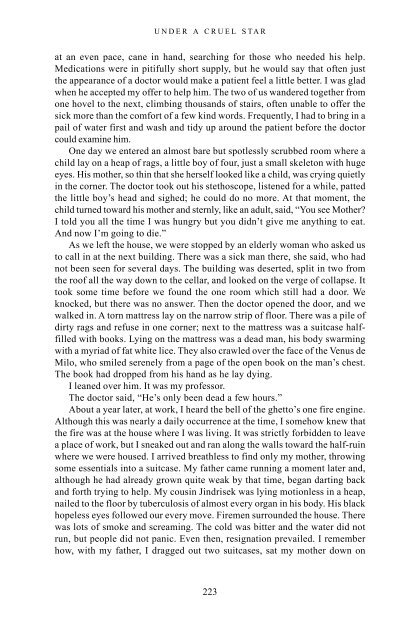The_Holokaust_-_origins,_implementation,_aftermath
The_Holokaust_-_origins,_implementation,_aftermath
The_Holokaust_-_origins,_implementation,_aftermath
You also want an ePaper? Increase the reach of your titles
YUMPU automatically turns print PDFs into web optimized ePapers that Google loves.
UNDER A CRUEL STAR<br />
at an even pace, cane in hand, searching for those who needed his help.<br />
Medications were in pitifully short supply, but he would say that often just<br />
the appearance of a doctor would make a patient feel a little better. I was glad<br />
when he accepted my offer to help him. <strong>The</strong> two of us wandered together from<br />
one hovel to the next, climbing thousands of stairs, often unable to offer the<br />
sick more than the comfort of a few kind words. Frequently, I had to bring in a<br />
pail of water first and wash and tidy up around the patient before the doctor<br />
could examine him.<br />
One day we entered an almost bare but spotlessly scrubbed room where a<br />
child lay on a heap of rags, a little boy of four, just a small skeleton with huge<br />
eyes. His mother, so thin that she herself looked like a child, was crying quietly<br />
in the corner. <strong>The</strong> doctor took out his stethoscope, listened for a while, patted<br />
the little boy’s head and sighed; he could do no more. At that moment, the<br />
child turned toward his mother and sternly, like an adult, said, “You see Mother<br />
I told you all the time I was hungry but you didn’t give me anything to eat.<br />
And now I’m going to die.”<br />
As we left the house, we were stopped by an elderly woman who asked us<br />
to call in at the next building. <strong>The</strong>re was a sick man there, she said, who had<br />
not been seen for several days. <strong>The</strong> building was deserted, split in two from<br />
the roof all the way down to the cellar, and looked on the verge of collapse. It<br />
took some time before we found the one room which still had a door. We<br />
knocked, but there was no answer. <strong>The</strong>n the doctor opened the door, and we<br />
walked in. A torn mattress lay on the narrow strip of floor. <strong>The</strong>re was a pile of<br />
dirty rags and refuse in one corner; next to the mattress was a suitcase halffilled<br />
with books. Lying on the mattress was a dead man, his body swarming<br />
with a myriad of fat white lice. <strong>The</strong>y also crawled over the face of the Venus de<br />
Milo, who smiled serenely from a page of the open book on the man’s chest.<br />
<strong>The</strong> book had dropped from his hand as he lay dying.<br />
I leaned over him. It was my professor.<br />
<strong>The</strong> doctor said, “He’s only been dead a few hours.”<br />
About a year later, at work, I heard the bell of the ghetto’s one fire engine.<br />
Although this was nearly a daily occurrence at the time, I somehow knew that<br />
the fire was at the house where I was living. It was strictly forbidden to leave<br />
a place of work, but I sneaked out and ran along the walls toward the half-ruin<br />
where we were housed. I arrived breathless to find only my mother, throwing<br />
some essentials into a suitcase. My father came running a moment later and,<br />
although he had already grown quite weak by that time, began darting back<br />
and forth trying to help. My cousin Jindrisek was lying motionless in a heap,<br />
nailed to the floor by tuberculosis of almost every organ in his body. His black<br />
hopeless eyes followed our every move. Firemen surrounded the house. <strong>The</strong>re<br />
was lots of smoke and screaming. <strong>The</strong> cold was bitter and the water did not<br />
run, but people did not panic. Even then, resignation prevailed. I remember<br />
how, with my father, I dragged out two suitcases, sat my mother down on<br />
223



